Company Law 401: Business Structures, Director Duties & Governance
VerifiedAdded on 2023/06/11
|8
|2933
|191
Report
AI Summary
This assignment comprises two parts: The first part is a letter advising a client, John Smith, on the optimal business structure for his men's clothing venture, comparing sole proprietorships, partnerships, and companies, highlighting the advantages and disadvantages of each, and ultimately recommending a company structure due to its separate legal personality, limited liability, perpetual succession, favorable taxation rates, and ease of capital raising. The second part outlines the various duties of company directors as per the Corporation Act 2001, including the duty of care and diligence (Section 180), the duty to act in good faith (Section 181), and their significance in ensuring effective corporate governance, emphasizing the importance of directors acting in the company's best interests and for proper purposes.
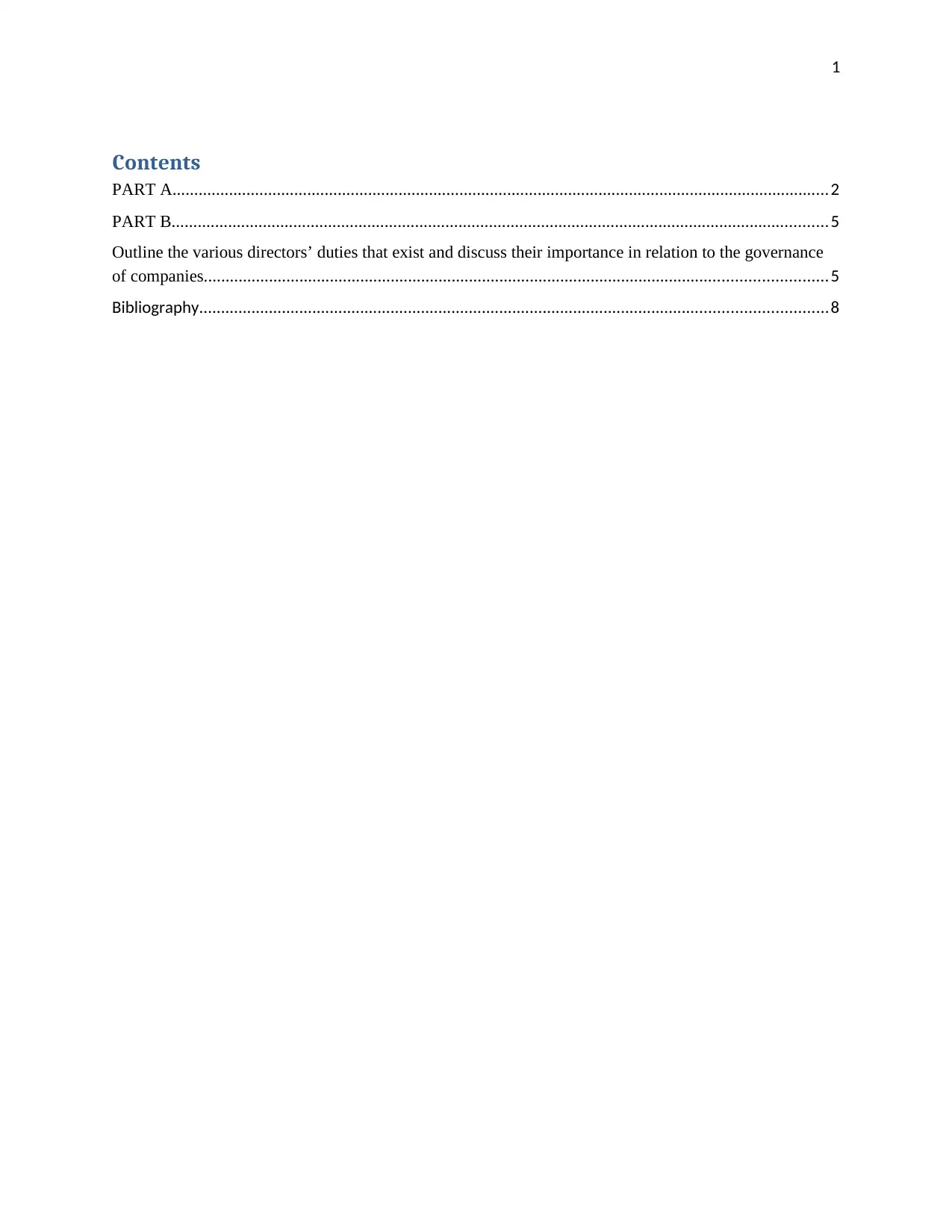
1
Contents
PART A.......................................................................................................................................................2
PART B.......................................................................................................................................................5
Outline the various directors’ duties that exist and discuss their importance in relation to the governance
of companies...............................................................................................................................................5
Bibliography................................................................................................................................................8
Contents
PART A.......................................................................................................................................................2
PART B.......................................................................................................................................................5
Outline the various directors’ duties that exist and discuss their importance in relation to the governance
of companies...............................................................................................................................................5
Bibliography................................................................................................................................................8
Paraphrase This Document
Need a fresh take? Get an instant paraphrase of this document with our AI Paraphraser
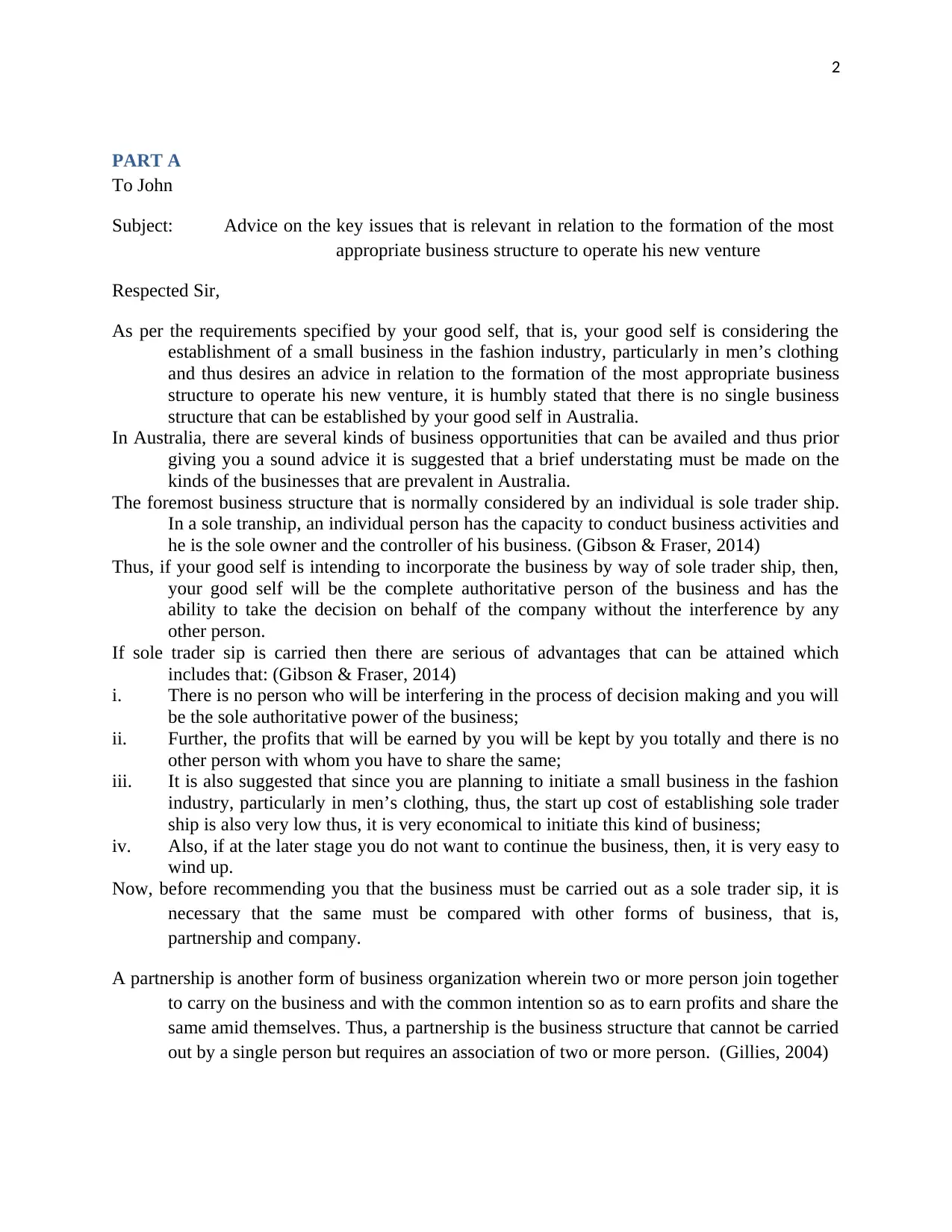
2
PART A
To John
Subject: Advice on the key issues that is relevant in relation to the formation of the most
appropriate business structure to operate his new venture
Respected Sir,
As per the requirements specified by your good self, that is, your good self is considering the
establishment of a small business in the fashion industry, particularly in men’s clothing
and thus desires an advice in relation to the formation of the most appropriate business
structure to operate his new venture, it is humbly stated that there is no single business
structure that can be established by your good self in Australia.
In Australia, there are several kinds of business opportunities that can be availed and thus prior
giving you a sound advice it is suggested that a brief understating must be made on the
kinds of the businesses that are prevalent in Australia.
The foremost business structure that is normally considered by an individual is sole trader ship.
In a sole tranship, an individual person has the capacity to conduct business activities and
he is the sole owner and the controller of his business. (Gibson & Fraser, 2014)
Thus, if your good self is intending to incorporate the business by way of sole trader ship, then,
your good self will be the complete authoritative person of the business and has the
ability to take the decision on behalf of the company without the interference by any
other person.
If sole trader sip is carried then there are serious of advantages that can be attained which
includes that: (Gibson & Fraser, 2014)
i. There is no person who will be interfering in the process of decision making and you will
be the sole authoritative power of the business;
ii. Further, the profits that will be earned by you will be kept by you totally and there is no
other person with whom you have to share the same;
iii. It is also suggested that since you are planning to initiate a small business in the fashion
industry, particularly in men’s clothing, thus, the start up cost of establishing sole trader
ship is also very low thus, it is very economical to initiate this kind of business;
iv. Also, if at the later stage you do not want to continue the business, then, it is very easy to
wind up.
Now, before recommending you that the business must be carried out as a sole trader sip, it is
necessary that the same must be compared with other forms of business, that is,
partnership and company.
A partnership is another form of business organization wherein two or more person join together
to carry on the business and with the common intention so as to earn profits and share the
same amid themselves. Thus, a partnership is the business structure that cannot be carried
out by a single person but requires an association of two or more person. (Gillies, 2004)
PART A
To John
Subject: Advice on the key issues that is relevant in relation to the formation of the most
appropriate business structure to operate his new venture
Respected Sir,
As per the requirements specified by your good self, that is, your good self is considering the
establishment of a small business in the fashion industry, particularly in men’s clothing
and thus desires an advice in relation to the formation of the most appropriate business
structure to operate his new venture, it is humbly stated that there is no single business
structure that can be established by your good self in Australia.
In Australia, there are several kinds of business opportunities that can be availed and thus prior
giving you a sound advice it is suggested that a brief understating must be made on the
kinds of the businesses that are prevalent in Australia.
The foremost business structure that is normally considered by an individual is sole trader ship.
In a sole tranship, an individual person has the capacity to conduct business activities and
he is the sole owner and the controller of his business. (Gibson & Fraser, 2014)
Thus, if your good self is intending to incorporate the business by way of sole trader ship, then,
your good self will be the complete authoritative person of the business and has the
ability to take the decision on behalf of the company without the interference by any
other person.
If sole trader sip is carried then there are serious of advantages that can be attained which
includes that: (Gibson & Fraser, 2014)
i. There is no person who will be interfering in the process of decision making and you will
be the sole authoritative power of the business;
ii. Further, the profits that will be earned by you will be kept by you totally and there is no
other person with whom you have to share the same;
iii. It is also suggested that since you are planning to initiate a small business in the fashion
industry, particularly in men’s clothing, thus, the start up cost of establishing sole trader
ship is also very low thus, it is very economical to initiate this kind of business;
iv. Also, if at the later stage you do not want to continue the business, then, it is very easy to
wind up.
Now, before recommending you that the business must be carried out as a sole trader sip, it is
necessary that the same must be compared with other forms of business, that is,
partnership and company.
A partnership is another form of business organization wherein two or more person join together
to carry on the business and with the common intention so as to earn profits and share the
same amid themselves. Thus, a partnership is the business structure that cannot be carried
out by a single person but requires an association of two or more person. (Gillies, 2004)
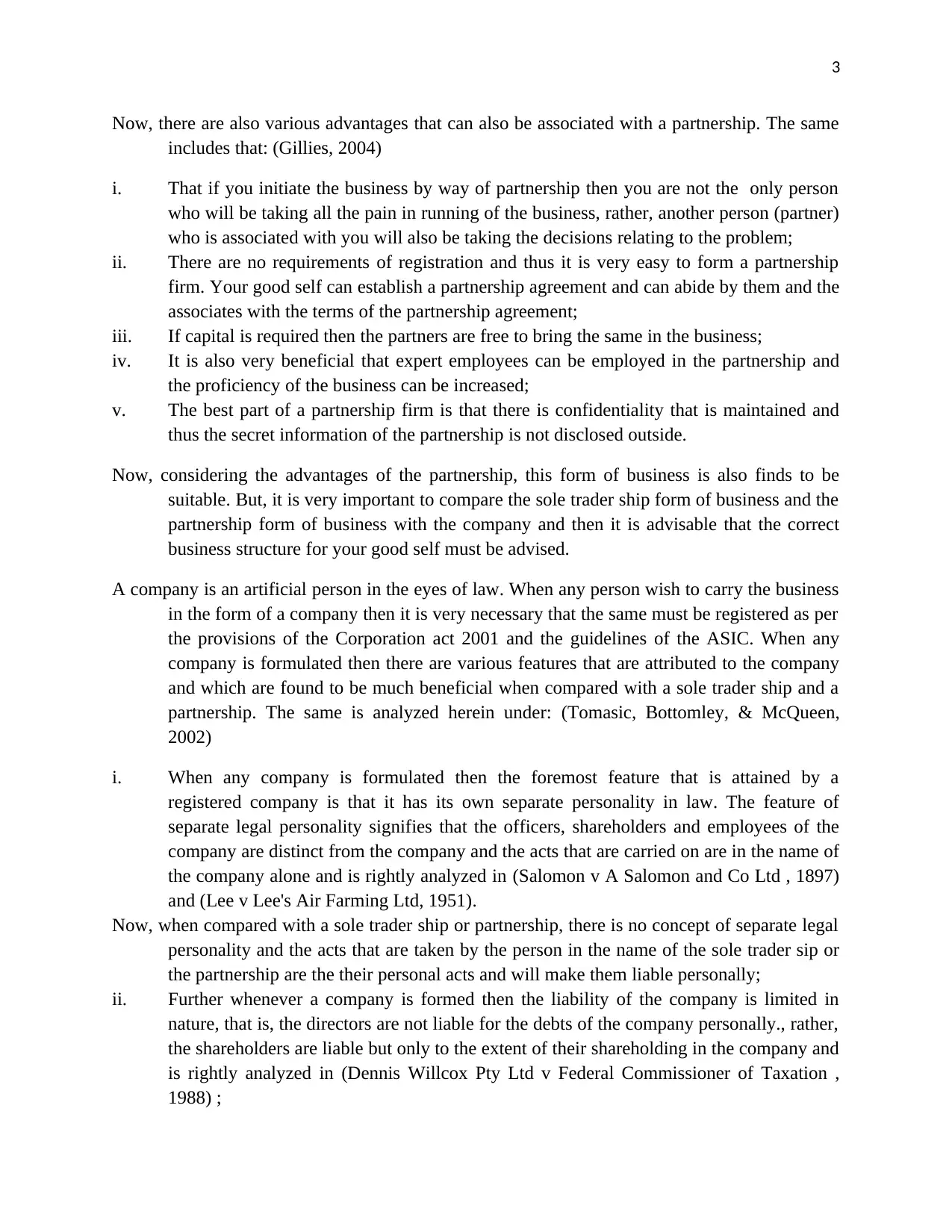
3
Now, there are also various advantages that can also be associated with a partnership. The same
includes that: (Gillies, 2004)
i. That if you initiate the business by way of partnership then you are not the only person
who will be taking all the pain in running of the business, rather, another person (partner)
who is associated with you will also be taking the decisions relating to the problem;
ii. There are no requirements of registration and thus it is very easy to form a partnership
firm. Your good self can establish a partnership agreement and can abide by them and the
associates with the terms of the partnership agreement;
iii. If capital is required then the partners are free to bring the same in the business;
iv. It is also very beneficial that expert employees can be employed in the partnership and
the proficiency of the business can be increased;
v. The best part of a partnership firm is that there is confidentiality that is maintained and
thus the secret information of the partnership is not disclosed outside.
Now, considering the advantages of the partnership, this form of business is also finds to be
suitable. But, it is very important to compare the sole trader ship form of business and the
partnership form of business with the company and then it is advisable that the correct
business structure for your good self must be advised.
A company is an artificial person in the eyes of law. When any person wish to carry the business
in the form of a company then it is very necessary that the same must be registered as per
the provisions of the Corporation act 2001 and the guidelines of the ASIC. When any
company is formulated then there are various features that are attributed to the company
and which are found to be much beneficial when compared with a sole trader ship and a
partnership. The same is analyzed herein under: (Tomasic, Bottomley, & McQueen,
2002)
i. When any company is formulated then the foremost feature that is attained by a
registered company is that it has its own separate personality in law. The feature of
separate legal personality signifies that the officers, shareholders and employees of the
company are distinct from the company and the acts that are carried on are in the name of
the company alone and is rightly analyzed in (Salomon v A Salomon and Co Ltd , 1897)
and (Lee v Lee's Air Farming Ltd, 1951).
Now, when compared with a sole trader ship or partnership, there is no concept of separate legal
personality and the acts that are taken by the person in the name of the sole trader sip or
the partnership are the their personal acts and will make them liable personally;
ii. Further whenever a company is formed then the liability of the company is limited in
nature, that is, the directors are not liable for the debts of the company personally., rather,
the shareholders are liable but only to the extent of their shareholding in the company and
is rightly analyzed in (Dennis Willcox Pty Ltd v Federal Commissioner of Taxation ,
1988) ;
Now, there are also various advantages that can also be associated with a partnership. The same
includes that: (Gillies, 2004)
i. That if you initiate the business by way of partnership then you are not the only person
who will be taking all the pain in running of the business, rather, another person (partner)
who is associated with you will also be taking the decisions relating to the problem;
ii. There are no requirements of registration and thus it is very easy to form a partnership
firm. Your good self can establish a partnership agreement and can abide by them and the
associates with the terms of the partnership agreement;
iii. If capital is required then the partners are free to bring the same in the business;
iv. It is also very beneficial that expert employees can be employed in the partnership and
the proficiency of the business can be increased;
v. The best part of a partnership firm is that there is confidentiality that is maintained and
thus the secret information of the partnership is not disclosed outside.
Now, considering the advantages of the partnership, this form of business is also finds to be
suitable. But, it is very important to compare the sole trader ship form of business and the
partnership form of business with the company and then it is advisable that the correct
business structure for your good self must be advised.
A company is an artificial person in the eyes of law. When any person wish to carry the business
in the form of a company then it is very necessary that the same must be registered as per
the provisions of the Corporation act 2001 and the guidelines of the ASIC. When any
company is formulated then there are various features that are attributed to the company
and which are found to be much beneficial when compared with a sole trader ship and a
partnership. The same is analyzed herein under: (Tomasic, Bottomley, & McQueen,
2002)
i. When any company is formulated then the foremost feature that is attained by a
registered company is that it has its own separate personality in law. The feature of
separate legal personality signifies that the officers, shareholders and employees of the
company are distinct from the company and the acts that are carried on are in the name of
the company alone and is rightly analyzed in (Salomon v A Salomon and Co Ltd , 1897)
and (Lee v Lee's Air Farming Ltd, 1951).
Now, when compared with a sole trader ship or partnership, there is no concept of separate legal
personality and the acts that are taken by the person in the name of the sole trader sip or
the partnership are the their personal acts and will make them liable personally;
ii. Further whenever a company is formed then the liability of the company is limited in
nature, that is, the directors are not liable for the debts of the company personally., rather,
the shareholders are liable but only to the extent of their shareholding in the company and
is rightly analyzed in (Dennis Willcox Pty Ltd v Federal Commissioner of Taxation ,
1988) ;
⊘ This is a preview!⊘
Do you want full access?
Subscribe today to unlock all pages.

Trusted by 1+ million students worldwide
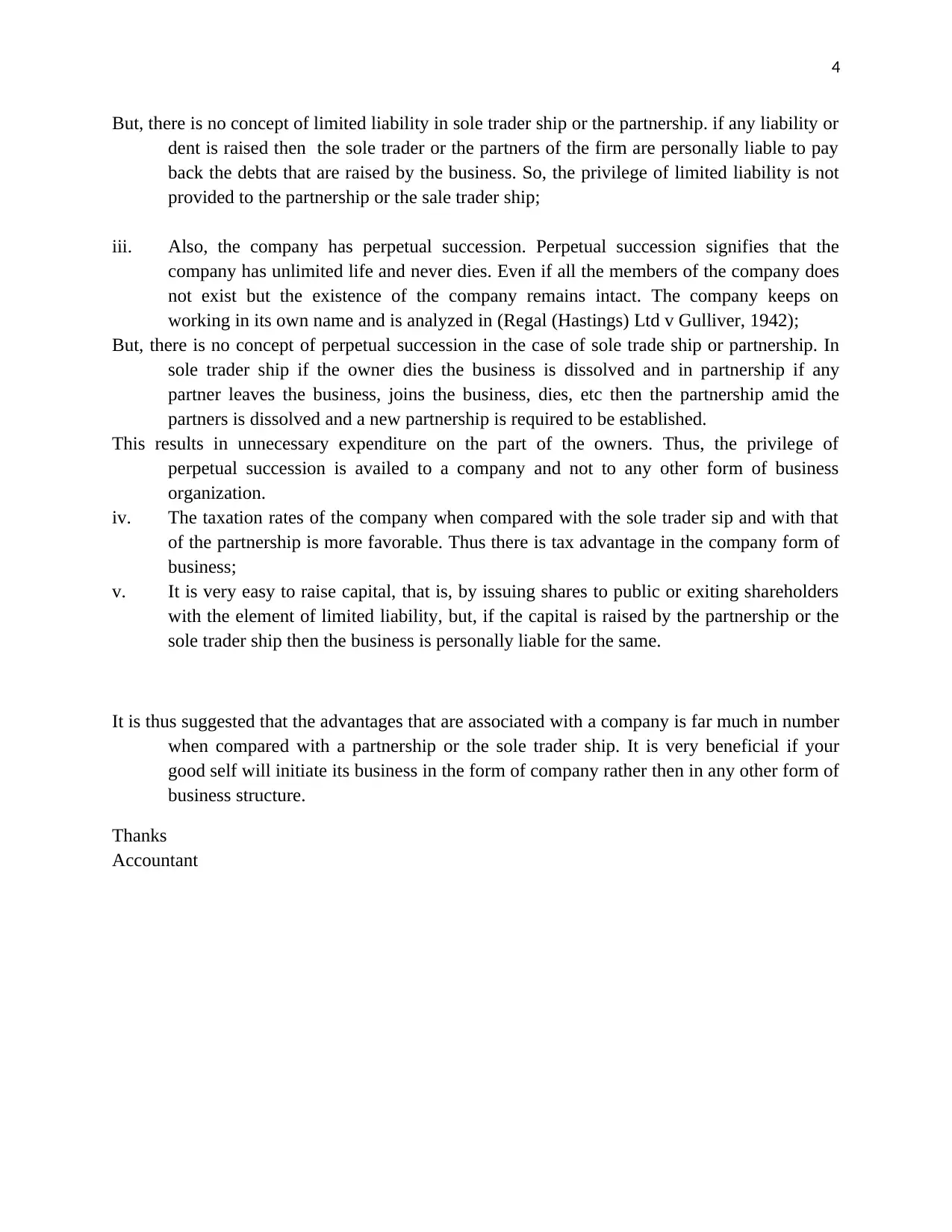
4
But, there is no concept of limited liability in sole trader ship or the partnership. if any liability or
dent is raised then the sole trader or the partners of the firm are personally liable to pay
back the debts that are raised by the business. So, the privilege of limited liability is not
provided to the partnership or the sale trader ship;
iii. Also, the company has perpetual succession. Perpetual succession signifies that the
company has unlimited life and never dies. Even if all the members of the company does
not exist but the existence of the company remains intact. The company keeps on
working in its own name and is analyzed in (Regal (Hastings) Ltd v Gulliver, 1942);
But, there is no concept of perpetual succession in the case of sole trade ship or partnership. In
sole trader ship if the owner dies the business is dissolved and in partnership if any
partner leaves the business, joins the business, dies, etc then the partnership amid the
partners is dissolved and a new partnership is required to be established.
This results in unnecessary expenditure on the part of the owners. Thus, the privilege of
perpetual succession is availed to a company and not to any other form of business
organization.
iv. The taxation rates of the company when compared with the sole trader sip and with that
of the partnership is more favorable. Thus there is tax advantage in the company form of
business;
v. It is very easy to raise capital, that is, by issuing shares to public or exiting shareholders
with the element of limited liability, but, if the capital is raised by the partnership or the
sole trader ship then the business is personally liable for the same.
It is thus suggested that the advantages that are associated with a company is far much in number
when compared with a partnership or the sole trader ship. It is very beneficial if your
good self will initiate its business in the form of company rather then in any other form of
business structure.
Thanks
Accountant
But, there is no concept of limited liability in sole trader ship or the partnership. if any liability or
dent is raised then the sole trader or the partners of the firm are personally liable to pay
back the debts that are raised by the business. So, the privilege of limited liability is not
provided to the partnership or the sale trader ship;
iii. Also, the company has perpetual succession. Perpetual succession signifies that the
company has unlimited life and never dies. Even if all the members of the company does
not exist but the existence of the company remains intact. The company keeps on
working in its own name and is analyzed in (Regal (Hastings) Ltd v Gulliver, 1942);
But, there is no concept of perpetual succession in the case of sole trade ship or partnership. In
sole trader ship if the owner dies the business is dissolved and in partnership if any
partner leaves the business, joins the business, dies, etc then the partnership amid the
partners is dissolved and a new partnership is required to be established.
This results in unnecessary expenditure on the part of the owners. Thus, the privilege of
perpetual succession is availed to a company and not to any other form of business
organization.
iv. The taxation rates of the company when compared with the sole trader sip and with that
of the partnership is more favorable. Thus there is tax advantage in the company form of
business;
v. It is very easy to raise capital, that is, by issuing shares to public or exiting shareholders
with the element of limited liability, but, if the capital is raised by the partnership or the
sole trader ship then the business is personally liable for the same.
It is thus suggested that the advantages that are associated with a company is far much in number
when compared with a partnership or the sole trader ship. It is very beneficial if your
good self will initiate its business in the form of company rather then in any other form of
business structure.
Thanks
Accountant
Paraphrase This Document
Need a fresh take? Get an instant paraphrase of this document with our AI Paraphraser
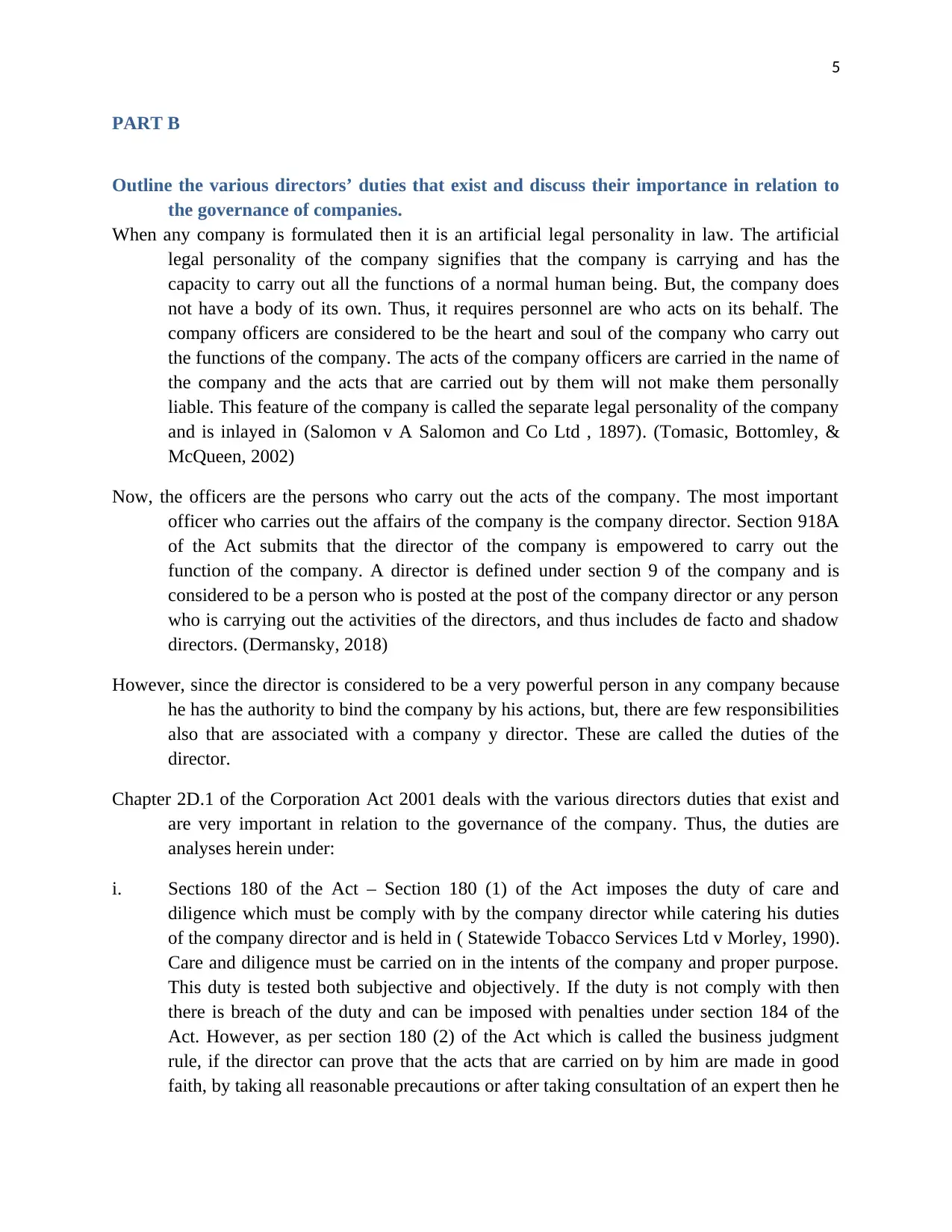
5
PART B
Outline the various directors’ duties that exist and discuss their importance in relation to
the governance of companies.
When any company is formulated then it is an artificial legal personality in law. The artificial
legal personality of the company signifies that the company is carrying and has the
capacity to carry out all the functions of a normal human being. But, the company does
not have a body of its own. Thus, it requires personnel are who acts on its behalf. The
company officers are considered to be the heart and soul of the company who carry out
the functions of the company. The acts of the company officers are carried in the name of
the company and the acts that are carried out by them will not make them personally
liable. This feature of the company is called the separate legal personality of the company
and is inlayed in (Salomon v A Salomon and Co Ltd , 1897). (Tomasic, Bottomley, &
McQueen, 2002)
Now, the officers are the persons who carry out the acts of the company. The most important
officer who carries out the affairs of the company is the company director. Section 918A
of the Act submits that the director of the company is empowered to carry out the
function of the company. A director is defined under section 9 of the company and is
considered to be a person who is posted at the post of the company director or any person
who is carrying out the activities of the directors, and thus includes de facto and shadow
directors. (Dermansky, 2018)
However, since the director is considered to be a very powerful person in any company because
he has the authority to bind the company by his actions, but, there are few responsibilities
also that are associated with a company y director. These are called the duties of the
director.
Chapter 2D.1 of the Corporation Act 2001 deals with the various directors duties that exist and
are very important in relation to the governance of the company. Thus, the duties are
analyses herein under:
i. Sections 180 of the Act – Section 180 (1) of the Act imposes the duty of care and
diligence which must be comply with by the company director while catering his duties
of the company director and is held in ( Statewide Tobacco Services Ltd v Morley, 1990).
Care and diligence must be carried on in the intents of the company and proper purpose.
This duty is tested both subjective and objectively. If the duty is not comply with then
there is breach of the duty and can be imposed with penalties under section 184 of the
Act. However, as per section 180 (2) of the Act which is called the business judgment
rule, if the director can prove that the acts that are carried on by him are made in good
faith, by taking all reasonable precautions or after taking consultation of an expert then he
PART B
Outline the various directors’ duties that exist and discuss their importance in relation to
the governance of companies.
When any company is formulated then it is an artificial legal personality in law. The artificial
legal personality of the company signifies that the company is carrying and has the
capacity to carry out all the functions of a normal human being. But, the company does
not have a body of its own. Thus, it requires personnel are who acts on its behalf. The
company officers are considered to be the heart and soul of the company who carry out
the functions of the company. The acts of the company officers are carried in the name of
the company and the acts that are carried out by them will not make them personally
liable. This feature of the company is called the separate legal personality of the company
and is inlayed in (Salomon v A Salomon and Co Ltd , 1897). (Tomasic, Bottomley, &
McQueen, 2002)
Now, the officers are the persons who carry out the acts of the company. The most important
officer who carries out the affairs of the company is the company director. Section 918A
of the Act submits that the director of the company is empowered to carry out the
function of the company. A director is defined under section 9 of the company and is
considered to be a person who is posted at the post of the company director or any person
who is carrying out the activities of the directors, and thus includes de facto and shadow
directors. (Dermansky, 2018)
However, since the director is considered to be a very powerful person in any company because
he has the authority to bind the company by his actions, but, there are few responsibilities
also that are associated with a company y director. These are called the duties of the
director.
Chapter 2D.1 of the Corporation Act 2001 deals with the various directors duties that exist and
are very important in relation to the governance of the company. Thus, the duties are
analyses herein under:
i. Sections 180 of the Act – Section 180 (1) of the Act imposes the duty of care and
diligence which must be comply with by the company director while catering his duties
of the company director and is held in ( Statewide Tobacco Services Ltd v Morley, 1990).
Care and diligence must be carried on in the intents of the company and proper purpose.
This duty is tested both subjective and objectively. If the duty is not comply with then
there is breach of the duty and can be imposed with penalties under section 184 of the
Act. However, as per section 180 (2) of the Act which is called the business judgment
rule, if the director can prove that the acts that are carried on by him are made in good
faith, by taking all reasonable precautions or after taking consultation of an expert then he
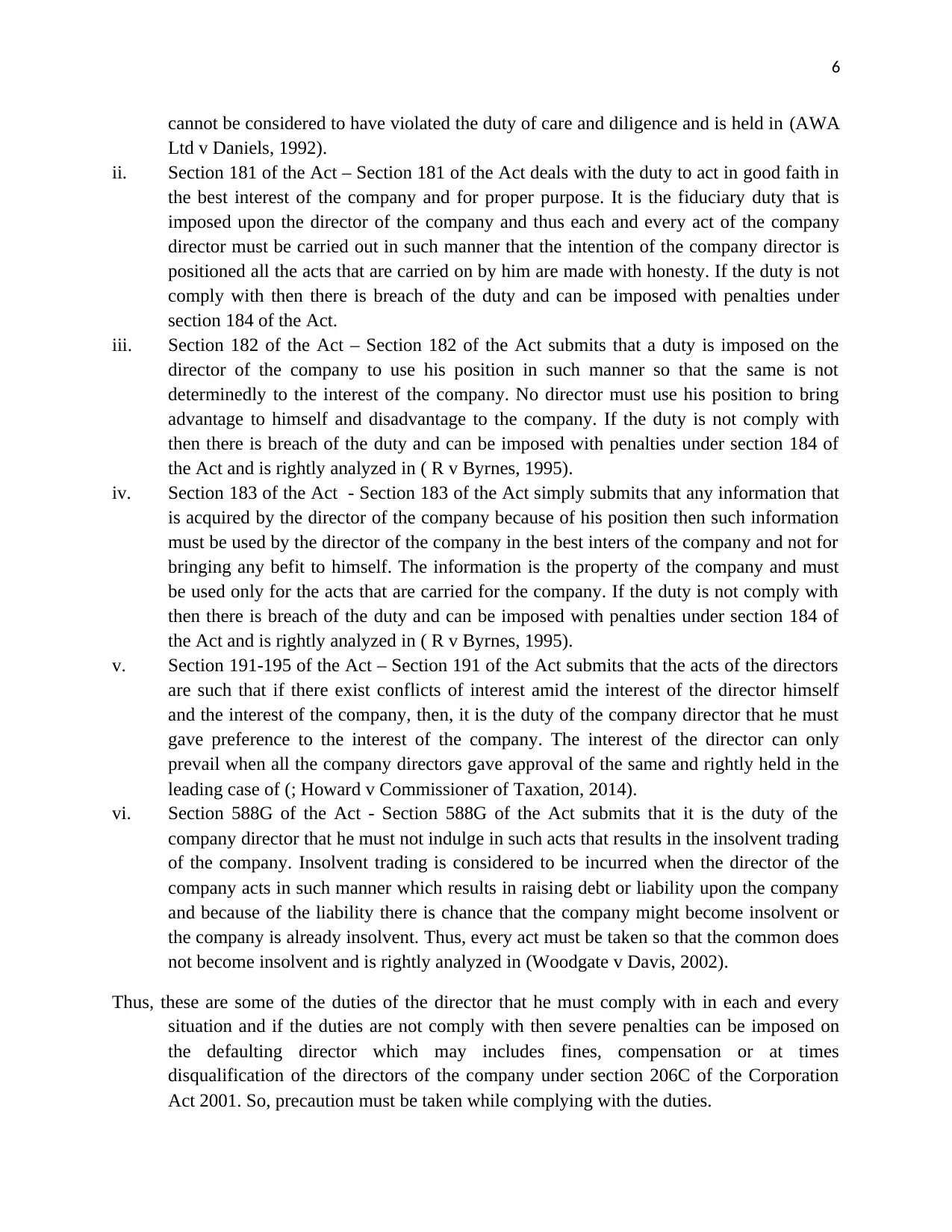
6
cannot be considered to have violated the duty of care and diligence and is held in (AWA
Ltd v Daniels, 1992).
ii. Section 181 of the Act – Section 181 of the Act deals with the duty to act in good faith in
the best interest of the company and for proper purpose. It is the fiduciary duty that is
imposed upon the director of the company and thus each and every act of the company
director must be carried out in such manner that the intention of the company director is
positioned all the acts that are carried on by him are made with honesty. If the duty is not
comply with then there is breach of the duty and can be imposed with penalties under
section 184 of the Act.
iii. Section 182 of the Act – Section 182 of the Act submits that a duty is imposed on the
director of the company to use his position in such manner so that the same is not
determinedly to the interest of the company. No director must use his position to bring
advantage to himself and disadvantage to the company. If the duty is not comply with
then there is breach of the duty and can be imposed with penalties under section 184 of
the Act and is rightly analyzed in ( R v Byrnes, 1995).
iv. Section 183 of the Act - Section 183 of the Act simply submits that any information that
is acquired by the director of the company because of his position then such information
must be used by the director of the company in the best inters of the company and not for
bringing any befit to himself. The information is the property of the company and must
be used only for the acts that are carried for the company. If the duty is not comply with
then there is breach of the duty and can be imposed with penalties under section 184 of
the Act and is rightly analyzed in ( R v Byrnes, 1995).
v. Section 191-195 of the Act – Section 191 of the Act submits that the acts of the directors
are such that if there exist conflicts of interest amid the interest of the director himself
and the interest of the company, then, it is the duty of the company director that he must
gave preference to the interest of the company. The interest of the director can only
prevail when all the company directors gave approval of the same and rightly held in the
leading case of (; Howard v Commissioner of Taxation, 2014).
vi. Section 588G of the Act - Section 588G of the Act submits that it is the duty of the
company director that he must not indulge in such acts that results in the insolvent trading
of the company. Insolvent trading is considered to be incurred when the director of the
company acts in such manner which results in raising debt or liability upon the company
and because of the liability there is chance that the company might become insolvent or
the company is already insolvent. Thus, every act must be taken so that the common does
not become insolvent and is rightly analyzed in (Woodgate v Davis, 2002).
Thus, these are some of the duties of the director that he must comply with in each and every
situation and if the duties are not comply with then severe penalties can be imposed on
the defaulting director which may includes fines, compensation or at times
disqualification of the directors of the company under section 206C of the Corporation
Act 2001. So, precaution must be taken while complying with the duties.
cannot be considered to have violated the duty of care and diligence and is held in (AWA
Ltd v Daniels, 1992).
ii. Section 181 of the Act – Section 181 of the Act deals with the duty to act in good faith in
the best interest of the company and for proper purpose. It is the fiduciary duty that is
imposed upon the director of the company and thus each and every act of the company
director must be carried out in such manner that the intention of the company director is
positioned all the acts that are carried on by him are made with honesty. If the duty is not
comply with then there is breach of the duty and can be imposed with penalties under
section 184 of the Act.
iii. Section 182 of the Act – Section 182 of the Act submits that a duty is imposed on the
director of the company to use his position in such manner so that the same is not
determinedly to the interest of the company. No director must use his position to bring
advantage to himself and disadvantage to the company. If the duty is not comply with
then there is breach of the duty and can be imposed with penalties under section 184 of
the Act and is rightly analyzed in ( R v Byrnes, 1995).
iv. Section 183 of the Act - Section 183 of the Act simply submits that any information that
is acquired by the director of the company because of his position then such information
must be used by the director of the company in the best inters of the company and not for
bringing any befit to himself. The information is the property of the company and must
be used only for the acts that are carried for the company. If the duty is not comply with
then there is breach of the duty and can be imposed with penalties under section 184 of
the Act and is rightly analyzed in ( R v Byrnes, 1995).
v. Section 191-195 of the Act – Section 191 of the Act submits that the acts of the directors
are such that if there exist conflicts of interest amid the interest of the director himself
and the interest of the company, then, it is the duty of the company director that he must
gave preference to the interest of the company. The interest of the director can only
prevail when all the company directors gave approval of the same and rightly held in the
leading case of (; Howard v Commissioner of Taxation, 2014).
vi. Section 588G of the Act - Section 588G of the Act submits that it is the duty of the
company director that he must not indulge in such acts that results in the insolvent trading
of the company. Insolvent trading is considered to be incurred when the director of the
company acts in such manner which results in raising debt or liability upon the company
and because of the liability there is chance that the company might become insolvent or
the company is already insolvent. Thus, every act must be taken so that the common does
not become insolvent and is rightly analyzed in (Woodgate v Davis, 2002).
Thus, these are some of the duties of the director that he must comply with in each and every
situation and if the duties are not comply with then severe penalties can be imposed on
the defaulting director which may includes fines, compensation or at times
disqualification of the directors of the company under section 206C of the Corporation
Act 2001. So, precaution must be taken while complying with the duties.
⊘ This is a preview!⊘
Do you want full access?
Subscribe today to unlock all pages.

Trusted by 1+ million students worldwide

7
Paraphrase This Document
Need a fresh take? Get an instant paraphrase of this document with our AI Paraphraser
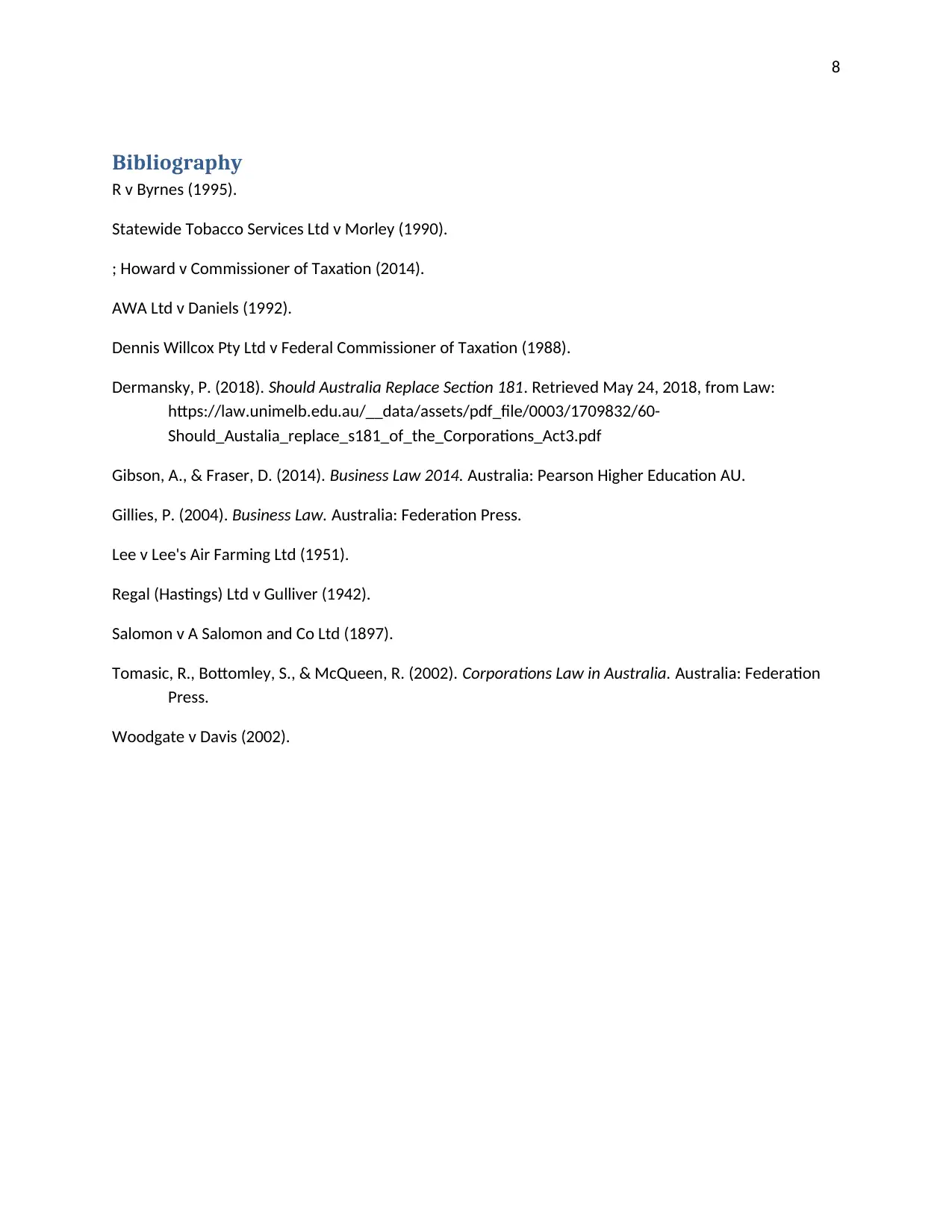
8
Bibliography
R v Byrnes (1995).
Statewide Tobacco Services Ltd v Morley (1990).
; Howard v Commissioner of Taxation (2014).
AWA Ltd v Daniels (1992).
Dennis Willcox Pty Ltd v Federal Commissioner of Taxation (1988).
Dermansky, P. (2018). Should Australia Replace Section 181. Retrieved May 24, 2018, from Law:
https://law.unimelb.edu.au/__data/assets/pdf_file/0003/1709832/60-
Should_Austalia_replace_s181_of_the_Corporations_Act3.pdf
Gibson, A., & Fraser, D. (2014). Business Law 2014. Australia: Pearson Higher Education AU.
Gillies, P. (2004). Business Law. Australia: Federation Press.
Lee v Lee's Air Farming Ltd (1951).
Regal (Hastings) Ltd v Gulliver (1942).
Salomon v A Salomon and Co Ltd (1897).
Tomasic, R., Bottomley, S., & McQueen, R. (2002). Corporations Law in Australia. Australia: Federation
Press.
Woodgate v Davis (2002).
Bibliography
R v Byrnes (1995).
Statewide Tobacco Services Ltd v Morley (1990).
; Howard v Commissioner of Taxation (2014).
AWA Ltd v Daniels (1992).
Dennis Willcox Pty Ltd v Federal Commissioner of Taxation (1988).
Dermansky, P. (2018). Should Australia Replace Section 181. Retrieved May 24, 2018, from Law:
https://law.unimelb.edu.au/__data/assets/pdf_file/0003/1709832/60-
Should_Austalia_replace_s181_of_the_Corporations_Act3.pdf
Gibson, A., & Fraser, D. (2014). Business Law 2014. Australia: Pearson Higher Education AU.
Gillies, P. (2004). Business Law. Australia: Federation Press.
Lee v Lee's Air Farming Ltd (1951).
Regal (Hastings) Ltd v Gulliver (1942).
Salomon v A Salomon and Co Ltd (1897).
Tomasic, R., Bottomley, S., & McQueen, R. (2002). Corporations Law in Australia. Australia: Federation
Press.
Woodgate v Davis (2002).
1 out of 8
Related Documents
Your All-in-One AI-Powered Toolkit for Academic Success.
+13062052269
info@desklib.com
Available 24*7 on WhatsApp / Email
![[object Object]](/_next/static/media/star-bottom.7253800d.svg)
Unlock your academic potential
Copyright © 2020–2026 A2Z Services. All Rights Reserved. Developed and managed by ZUCOL.





